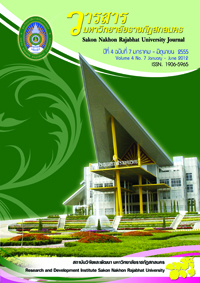การวิจัยเชิงปฏิบัติการเพื่อพัฒนาทักษะการแก้โจทย์ปัญหาคณิตศาสตร์ สองขั้นตอนของนักเรียนชั้นประถมศึกษาปีที่ 5 โรงเรียนเทศบาล 4 (รัตนโกสินทร์ 200 ปี) สังกัดเทศบาลเมืองนครพนม จังหวัดนครพนม
Abstract
บทคัดย่อ
การวิจัยครั้งนี้มีจุดมุ่งหมายเพื่อพัฒนาทักษะการแก้โจทย์ปัญหาทางคณิตศาสตร์ของนักเรียนด้วย กระบวนการวิจัยเชิงปฏิบัติการ กลุ่มเป้าหมายที่ใช้ในการวิจัยเป็นนักเรียนชั้นประถมศึกษาปีที่ 5/2 ภาคเรียนที่ 2 ปีการศึกษา 2553 โรงเรียนเทศบาล 4 (รัตนโกสินทร์ 200 ปี) จำนวน 43 คน เครื่องมือที่ใช้ในการทดลองครั้งนี้คือ 1) แผนการจัดการเรียนรู้คณิตศาสตร์ 2) แบบบันทึกประจำวันของครู 3) แบบสังเกตพฤติกรรมการเรียนของ นักเรียน 4) แบบสัมภาษณ์นักเรียน 5) อนุทินของนักเรียน 6) แบบฝึกทักษะประจำแผนการจัดการเรียนรู้และ 7) แบบทดสอบทักษะการแก้โจทย์ปัญหาคณิตศาสตร์ การวิจัยครั้งนี้ใช้รูปแบบการวิจัยเชิงปฏิบัติการ ซึ่งมีขั้นตอน ในการปฏิบัติ 4 ขั้นตอน ได้แก่ ขั้นวางแผน ขั้นปฏิบัติการ ขั้นสังเกตการณ์ และขั้นสะท้อนผลการปฏิบัติ ดำเนินการ 3 วงรอบ โดยนำข้อมูลที่ได้จากการรวบรวมผลการปฏิบัติในแต่ละวงรอบมาวิเคราะห์และปรับ แผนปฏิบัติการในวงรอบต่อไป
ผลการวิจัยพบว่า หลังการพัฒนาทักษะการแก้โจทย์ปัญหาคณิตศาสตร์สองขั้นตอนตาม กระบวนการวิจัยเชิงปฏิบัติการ นักเรียนกลุ่มเป้าหมายทั้งชั้นผ่านเกณฑ์ที่กำหนดไว้คือได้คะแนน ร้อยละ 70 ของคะแนนเต็ม เมื่อวิเคราะห์เป็นรายบุคคลพบว่า นักเรียนที่ได้คะแนนผ่านเกณฑ์มีจำนวนร้อยละ 90.70 ส่วน นักเรียนที่ไม่ผ่านเกณฑ์ก็สามารถทำคะแนนได้สูงกว่าร้อยละ 60
Abstract
The purpose of this study was to develop mathematical problem solving skill among students based on an action research process. The target group used for this study was 43 fifth grade primary students room 2, who were enrolled in the second semester of academic year 2010 at Municipality School 4 (the Rattanakosin Bicentennial). The tools used for this study comprised: (1) a mathematical learning management plan, (2) a teacher’s daily note-taking form, (3) a student’s learning behavior observation form, (4) a guide for interviewing with students, (5) a student’s diary, (6) a skill-practice exercise for each learning management plan, and (7) a test of mathematical problem solving skill. An action research methodology was used into 4 steps: planning, implementing the plan, observing, and reflection on practical result. The procedure was carried out in 3 rounds by analyzing the collected data of practical result from each round and adjusting the action plan to suit that in the next round.
The findings disclosed that the whole target group after being developed on mathematical problem solving skill based on an action research process with 3-round treatments could pass the standard criterion set at a percentage of 70 out of a full score. As analyzed on basis of each individual, 90.70 % of all the students passed the anticipated standard criterion. However, those students who did not pass the anticipated standard criterion were able to gain a score higher than 60 % of the total score.









